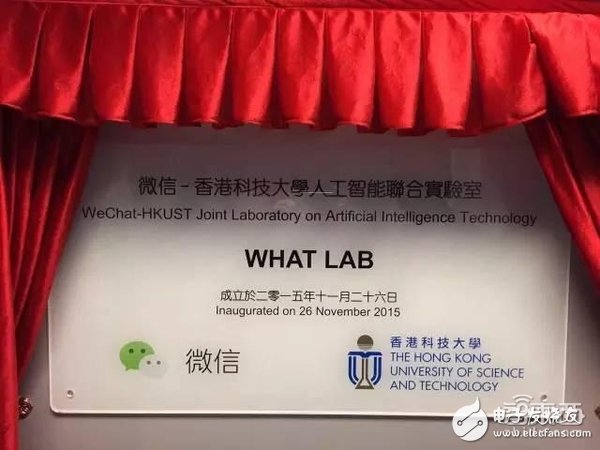Five years ago, artificial intelligence (ArTIficial Intelligence, abbreviated as AI) may also be a professional vocabulary. But five years later, personalized information push, face recognition, voice manipulation, etc., artificial intelligence technology has "invaded" into the details of daily life, and decisively influence the future direction of society.
The BBC predicts that the global artificial intelligence market will reach 119 billion yuan in 2020. In addition, the scale of iteration and development of AI-driven cloud services, big data analytics, mobile Internet, and Internet of Things is even more immeasurable.
BAT, which is at the forefront of the Internet, will naturally not miss these opportunities. To this end, the author plans three special reports to comprehensively analyze the layout and latest development of BAT in the field of artificial intelligence.
Today, from the Tencent Empire, which has “kidnapped†hundreds of millions of users through products such as WeChat and QQ.
In BAT, Tencent's AI layout is relatively late, more business-driven, and then gradually increase investment, full bloom, mainly around three paths:
1. Based on Tencent's core products and technological advantages, different business systems are formed to break through in artificial intelligence.
2. Secretly set up research teams and laboratories focused on the underlying foundation to do long-term technology accumulation.
3, muffled the acquisition and investment of a number of outstanding companies in the field of artificial intelligence companies.
First, paying for the land: biased overseas

In Tencent's huge investment M&A list, it is mainly based on general entertainment, medical health, games, and automobile transportation. It is a small space for AI start-ups, but it is closely related to the main field. The investment projects are biased towards overseas regions, and the investment rounds are mostly based on angels and the early A round.
In the past two years, Tencent disclosed the investment projects in the AI ​​field as follows:
1) Diffbot
Diffbot is a data company based in the Bay Area. Founded in 2012, it uses artificial intelligence technology to allow “machines†to capture key content of web pages and output structured data that software can directly identify. This year, Tencent and Silicon Valley venture capital firm Felicis Ventures led the Diffbot $10 million Series A.
2) iCarbonX
iCarbonX Chinese is called Carbon Cloud Intelligence. It was founded by Wang Jun, a former partner of Huada Gene. Its business field continues the health care of Huada Gene, and it is positioned in the research of digital life ecosystem created by life big data, internet and artificial intelligence. .
In April, Carbon Cloud Intelligence completed nearly RMB 1 billion of Series A financing, and Tencent, Zhongyuan Concord and Tianfu Group were major investors.
3) CloudMedx
CloudMedX is a provider of healthcare data collection and analysis services that collects data from a variety of hospitals in real time and provides healthcare organizations with health predictions and analysis that comply with the HIPAA (Health Insurance Portability and Accountability Act). CloudMedx analyzes the original patient data to reflect the development trend, pattern, bias and predictive outcome of some diseases, which provides a very useful reference for clinical treatment and early detection and diagnosis.
In May 2015, Tencent injected $6.3 million in angel round investment into CloudMedx.
4) Skymind
Skymind was created by Adam Gibson in June 2014 and is primarily engaged in the open source project DeepLearning4j. Skymind provides support services for companies that use DeepLearning4j, while integrating deep learning into Hadoop systems, where users store, process, and analyze different types of data.
In April 2015, Tencent injected a multi-million dollar angel round of investment into Skymind.
5) ScaledInference
Scaled Inference was founded in 2014 by two former Google engineers. It is a cloud computing service for all individuals. Develop machine learning and artificial intelligence technologies used internally by companies like Google and develop it into a cloud computing service that anyone can use.
In July 2014, Tencent invested in Scaled Inference.
6) Sogou
This investment case can be traced back to 2013. Tencent has invested 448 million US dollars in Sogou, and its search and QQ input method is incorporated into Sogou's existing business. The new Sogou will continue to operate independently as a subsidiary of Sohu.
Tencent’s investment at the time was more like a continuation of the 3Q war and a background based on the lack of improvement in its own search business. However, in the development of the following years, Sogou has gradually evolved from a search and input method product company to a voice intelligence and big data company.
In addition, Yao Xing, senior vice president of Tencent, said that he and Tencent's investment M&A department have reached a consensus and began to inspect a large number of American machine learning platform startups. There are not many technology companies in China; the second is to acquire such a company to quickly fill Tencent's shortcomings in the algorithm field.
Second, basic research: scattered around

In the field of basic research, Tencent has set up different laboratories and business teams in combination with major business advantages and domain directions such as WeChat, QQ, and finance. In addition to serving its own business, it also launched industry products in related fields.
1) Hong Kong: WHAT LAB
Compared with the resources of universities gathered in Beijing and Hangzhou, the younger Shenzhen is a bit thinner. At the end of last year, Tencent joined hands with Hong Kong University of Science and Technology and established a low-profile "WeChat-Hong Kong University of Science and Technology Artificial Intelligence Joint Laboratory", referred to as WHAT LAB. With artificial intelligence as the main research direction, it aims to improve the user's life service experience and expand the boundaries of machine learning with big data.
In addition, the Tencent Foundation donated 10 million yuan to promote the scientific research and innovation of the Hong Kong University of Science and Technology, and through the in-depth cooperation between the two sides to build an effective platform for communication between industry, academia and research, and jointly promote the transformation of application results.
2) Shanghai & Hefei: Utu Lab
Tencent is a member of the Tencent social network business group. It was established in 2012 and is located in Shanghai and Hefei. Focus on image processing, pattern recognition, machine learning, data mining and other fields to carry out technical research and development and business.
After several years of development, Tencent Excellent has gradually accumulated world-class face technology such as face detection, facial features registration, feature extraction comparison and live detection. Combining voice, lip language and facial expressions, "Utopia Face Recognition" can be used to stereoscopically defend against attacks such as photos, videos and head models.
In June, on the international authoritative face recognition database LFW, Uto has a record of 99.65%, surpassing the top teams such as Linkface, Face++, Facebook and Google.
The Shanghai team has provided image technology support for more than 50 businesses of Tencent. The technology mainly serves QQ space, watermark camera, and daily P-pictures. Hefei team's related technology is mainly for daily P-picture, charm and other products, good at picture beautification, portrait beauty, image recognition and various filter technologies.
3) Beijing: WeChat Pattern Recognition Center
The core teams that drive the development of WeChat new technologies and functions are mainly two. One is the R&D team in Beijing, which originated from the original Tencent Institute. After the dissolution of Tencent Research Institute, some people were included in the WeChat department. The outside world’s perception is that this is a team for “pattern recognition†research. It was first established in September 2010 and is now called WeChat Beijing R&D Center.
The research direction of the team includes speech recognition, image analysis, semantic understanding, WeChat big data mining, etc. Its research and development results are widely used in other products of WeChat and Tencent. The services provided by the company include WeChat voice recognition, image analysis, audio fingerprinting, WeChat semantic customer service robot, etc. The daily service volume reaches tens of millions. At present, we are committed to creating a platform for WeChat dialogue robots, and more intelligently connecting the services of the WeChat public platform.
In fact, most of the things that the team has done are used by WeChat users, such as voice-to-text in WeChat, voiceprint recognition, and shake in TV programs.
"Although these new features may seem simple, the technology behind it takes a long time," said a former Tencent employee. "The bottom layer technology will be quiet for a few years, and the implementation of the application layer will be much shorter."
4) Intelligent Computing and Search Lab
Founded in 2015, Tencent's Intelligent Computing and Search Lab is focused on four areas of research: search technology, natural language processing, data mining and artificial intelligence.
The laboratory mainly organized academic and motivated employees in the technology and engineering business group to participate in research work. At the same time, it cooperated with Harbin Institute of Technology and China University of Science and Technology and other universities. The research results were successfully applied to WeChat, QQ, QQ music, QQ video and other products. The search department focuses on natural language recognition. Through Tencent Cloud, the lab's two major products, Yunsou and Wenzhi, have been opened for use in the industry. However, the project recently disclosed little progress and progress, and the official website could not be opened.
In addition, according to informed sources, Tencent Artificial Intelligence Research Institute will be established in the near future.
150 Watt Solar Panel,Suntech Mono Solar Panel,Mono Cell Solar Panels,Lg Mono Solar Panel
Zhejiang G&P New Energy Technology Co.,Ltd , https://www.solarpanelgp.com